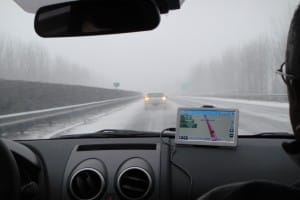The Chinese New Year holiday is all about “home.” It is a time when everyone longs for the feeling of being home. Although the holiday also involves lots of good food, fireworks and many other traditions, none of those is meaningful if home does not exist. Going home is the most important tradition.
Every year, my family spend Chinese New Year holiday with my grandparents in the city of Fushun, my father’s hometown. This year it was the second time that my parents and I drove home. In the past, we would take trains to Shenyang and then travel by car to the neighboring city of Fushun. However, because buying train tickets had become very difficult, driving became a viable option.
Driving has a lot of advantages. First, the car is a home environment, compared to the train cabin, public space. We have a lot more freedom inside the car—eating, chatting and resting—with minimal disturbance. Another distinct advantage is being able to bring a lot more food and gifts. In the past we could only pack as much as our suitcases could carry, but now we would fill up the trunk and occupy part of the back seats. In fact, most of the cars on the highway are overloaded with New Year gifts!
But driving can be affected by inclement weather conditions. This year we were stopped at a toll gate in suburban Beijing at eight o’clock in the morning. The highway was closed, the fog so heavy that we could barely see what was in front of the toll gate. In half an hour, thousands of cars packed the entrance to the highway, waiting for the fog to clear. After three hours, which actually did not seem very long, the highway reopened, and our journey finally began. Visibility was still lower than expected, and there were a few accidents on the road.

Lunch on the road was special: instant noodles. Instant noodles were not so healthy, but they surely smelled great inside the car.
As we advanced farther to the north in late afternoon, snow began to fall. The snowflakes were very big, and they covered the road in 10 minutes. Even though most cars were behind their schedules due to the delay in the morning, the drivers had to slow down to 60 km per hour, half the speed limit. The sky was getting dark, and it seemed that we might have to stay in a motel. At five o’clock in the evening, we still had more than half of the journey ahead of us.
But thanks to the vast distances of the country, we drove through the snow storm in 30 minutes. And mom picked up the speed again: we would be home before midnight.
Night fell at six o’clock, which was incredibly early. It was pitch dark on either side of the highway. The forests, the farmland and the houses in the countryside fell asleep. I never knew that lights could be so scarce on the way home.
We finally arrived in Shenyang at 8:30 p.m. Then we needed to rely on the GPS to find our way home. However, the GPS insisted on directing us to a route that was under construction, so my father, who spent his undergraduate years in Shenyang 30 years ago, relied on his vague sense of direction to guide us to a different route. Luckily, the GPS soon found a new route. After some time on an almost empty intercity highway, we were finally home after 15 hours on the road.
It was almost midnight, but grandma and grandpa still prepared dinner and stayed up. Half way through climbing the seven floors to grandma’s apartment, I heard the door open, along with the laughter from her, “You’re home!”
Homecoming is always the big day!
农历新年的一切都是围绕“家”的。 这个时候,每个人都渴望在家的感觉。虽然这个节日还包括美食,烟花和很多其他传统,但是如果没有家,这些传统都没有意义。回家是最重要的传统。
每年,我们一家人都和爷爷奶奶一起在我爸爸的老家抚顺过春节。今年是我们第二次开车回家。以前,我们都是先坐火车到沈阳,再坐汽车到沈阳旁边的抚顺。然而,买火车票越来越难,驾车倒是个可行的选择。
驾车有很多优势。首先,相比于火车车厢这样的公共空间,汽车是个家庭空间。我们在车里有很大的自由度—吃东西,聊天和休息,而且很少受到打扰。 另外一个明显的优势是驾车可以带更多食物和礼品。以前,行李箱能装下多少东西,我们就带多少,但现在,我们可以把东西装满汽车的后备箱,再把一部分放在后座 上。实际上,大多数在公路上跑的车里都装满了新年的礼物!
不过,开车会受到恶劣天气的影响。今年开车回家,早上八点的时候,我们在北京郊区的一个收费站停下了车。因为雾太大了,我们几乎看不到收费站后面的任何东西,所以公路被封了。 半个小时内,成千辆汽车堵在公路入口,等待大雾散去。 三个小时后(不过感觉时间并不长),高速又开放了,我们终于再次上路。能见度还是比预想得低,路上也发生了不少交通事故。
路上吃的午饭很特别:方便面。方便面并不是健康食品,但是他们在车里闻起来确实很香。
黄昏时分,我们往北开了很久,天空开始下雪。雪花很大,十分钟就铺满了路面。尽管很多车早上就耽误了不少时间,司机们还是要把车速减到60千米每小时一下,这是限速的一半。天色渐暗,我们估计要在汽车旅馆住一晚了。现在是晚上五点,我们还有多一半的路没有走。
不过好在中国地域宽广,我们30分钟过后驶出了暴风雪,妈妈又提高了车速:我们会在半夜之前到家的。
天黑得比我想象得早,六点钟太阳就落山了。 公路两侧漆黑一片。郊野的森林,农田和房屋都沉睡了。我从来没料想到,回家的路上,灯光如此之少。
我们最终在8:30抵达沈阳。随后,我们就要靠GPS来导航回家的路了。然而,GPS一直指向的一路正在维修,我爸爸30多年前在沈阳上过大学,所以凭着他模糊的方向感,他带着我们走了另一条路。幸运的是,GPS很快找到了一条新的路。在空荡的市际公路上开了一段时间后,我们终于到家了。一路上,我们走了15个小时。
我们到家的时候已经是半夜了,而爷爷奶奶还没睡,仍在准备晚餐。奶奶家在七层,我爬楼到一半的时候,就听见门打开了,还听到了奶奶的笑声:“你们终于到家了!”
回家永远是个重要的日子!


